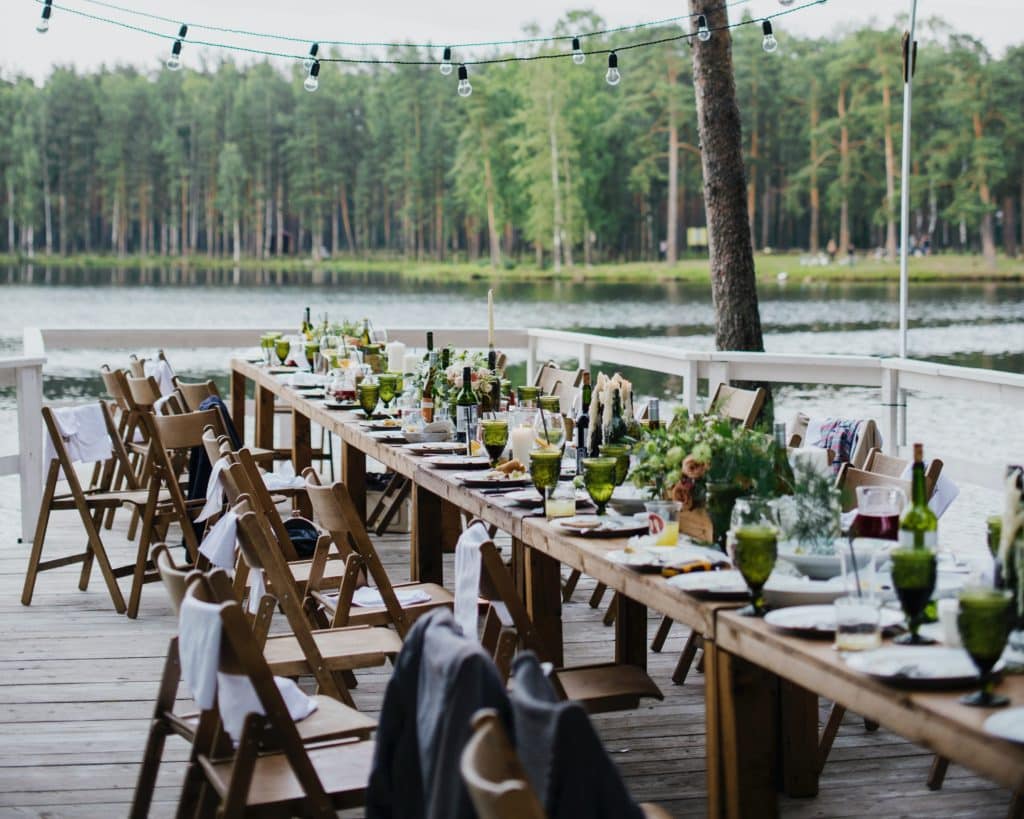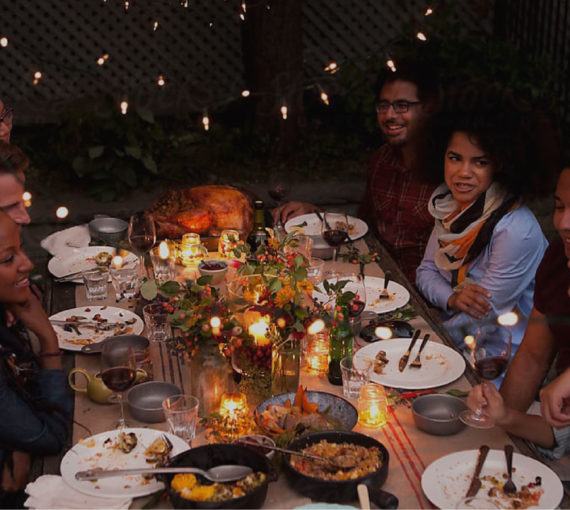
If you can, host outdoors. Your guests will feel more connected to nature and you’ll reduce energy use and save money! (Photo: Ksenia Chernaya via Pexels)
Planning and hosting an event of any size can be stressful. Whether it’s a birthday party, family reunion, corporate retreat — even a wedding — there are many elements to consider.
Because events are inherently wasteful, stress can rocket up when considering their environmental impact. The only way to minimize that is to be conscientious, intentional and thoughtful.
The best part? They can be opportunities to show your guests the benefits of hosting and attending events that care about them AND the planet!
Planning
As you start event planning, ask yourself (or your planning team) a few questions to ensure you start off on the right footprint. The International Association of Event Hosts says “decisions made at the early planning stages can significantly influence the types of environmental impacts that arise from the event.” So, when looking for event partners, ask yourself and potential suppliers:
- Do your values align?
- Can they help with a zero waste or low-impact event?
- Who is benefiting from your purchase or booking?
- Where do all the “things” come from?
Once you’re in the zone, your creativity will flourish and you’ll find many ways to reduce the event’s environmental footprint without compromising everyone’s enjoyment of the reason for gathering in the first place.
Short of ideas? Need further guidance? Search the Living Green archive.
Six eco-conscious event details to consider
Venue
- To minimize travel, choose a location close to most guests. Ensure inclusive access (i.e., close to transit options, wheelchair accessible, secure storage for bikes, strollers, coats, umbrellas and other valuables, etc.) and say that in your invitations. Encourage active transportation, public transit and carpooling.
- Choose a one-stop facility that meets all your needs, e.g., that can accommodate the ceremony, reception, cocktails and dinner for a wedding.
- Look for Leadership in Energy and Environmental Design certification or Passive House construction. If you can’t find the information online, ask venue management (their future decisions may be guided by your preferences.)
- Tell venue staff you’re planning a low-impact and/or zero waste event. Find out how they can assist in your recycling and composting plans and if they have rental or in-house catering services that meet your needs.
- If possible, host outdoors. Your guests will feel more connected to nature and you’ll reduce energy use and save money!
Catering
- Hire a caterer that aligns with your values (e.g., has composting arrangements and will donate surplus food to shelters or suggest guests bring reusable containers for leftovers).
- Emphasize a plant-based, vegetarian and/or a less-meat menu (e.g., instead of two meat or fish proteins, choose one and a plant-based dish).
- Choose local, seasonal food, beer, wine and spirits. Look for natural and organic products.
- Ask your guests about food allergies, dietary restrictions and other sensitivities.
- Choose plated food service, not a buffet. While a buffet may be easier, it requires extra food preparation and can waste more.
Invitations
- Send e-invites instead of paper. You can personalize them by adding pictures, music, graphics and/or video messages and send reminders.
- If you must use paper invitations, choose 100 per cent post-consumer, recycled, non-bleached paper products printed with natural inks.
- If you host a zero waste event but won’t have enough reusables for all your guests, note that in your invites. Ask your guests to bring the fun, leave single-use products on the shelf and bring their own reusable containers, travel mugs, water bottles, cutlery and cloth napkins.
- Be strict with RSVPs. Knowing the number of attendees means serving the right amount of food and helps eliminate waste.
- Provide accessibility and sustainable transportation information.
- Remind guests to avoid using products containing fragrance, in consideration of attendees with scent sensitivities and because those additives are often bad for the planet.
- Attach our green gift guide if gifts will be exchanged.
Rentals
- Rent as much as you can. Glassware, plates, cutlery, serving platters, utensils, linens, décor. Rental companies have the ultimate supply of reusables!
- Bonus: rental companies do the cleaning. They can do large batches of dishes in short periods of time, which minimizes the amount of water and cleaning products.
Décor and flowers
- Choose natural decorations. Seasonal and abundant plants and flowers are a beautiful addition to tables and centrepieces (e.g., pine cones and leaves for autumn events, potted herbs and plants in spring and summer, and potted spruce or pine for winter).
- Use local, seasonal, pesticide-free flowers. Try to buy in bulk and in water buckets (rather than bouquets already wrapped in plastic) from a wholesaler or local supplier.
- Forage from nature what you can harvest responsibly. (Remember: never take more than one-third – leave one-third to other species and one-third to maintain natural cycles.)
- DIY with what you already have at home — tablecloths, cloth napkins, fabric scraps or unconventional materials. Search online for DIY ideas! Borrow from friends and family or through a buy nothing group. Mine thrift stores and online marketplaces to avoid buying new.
- Choose a venue that already has beautiful views, architecture or art. Surrounding visual interest minimizes the need to “decorate.”
- Use beeswax or soy candles. Conventional candles are made from paraffin wax, which comes from petroleum, coal or oil shale and can be toxic.
- Consider minimizing scents for people with environmental sensitivities, and because fragrances are often bad for the planet.
Party favours
- Give natural things, e.g., native tree seedlings or non-invasive, native seeds for guests to plant.
- Give to a charity (like ours!) in their honour.



